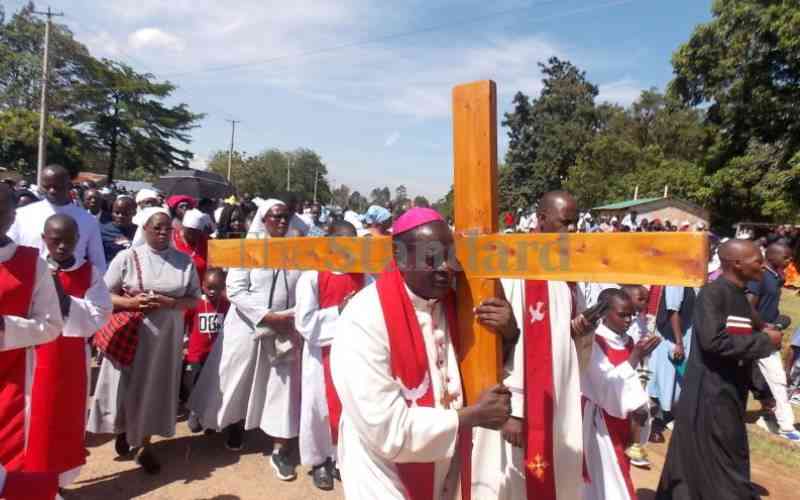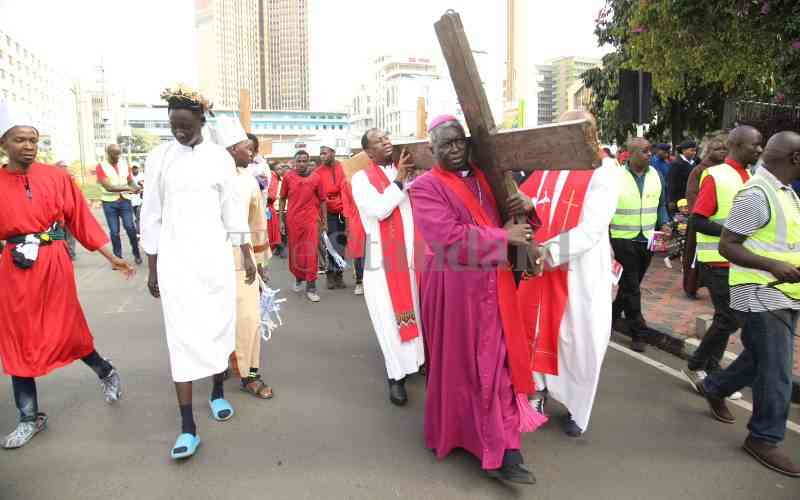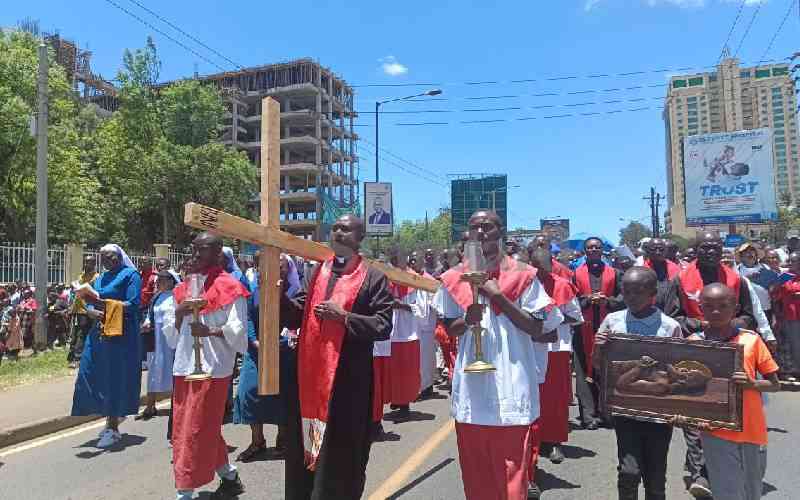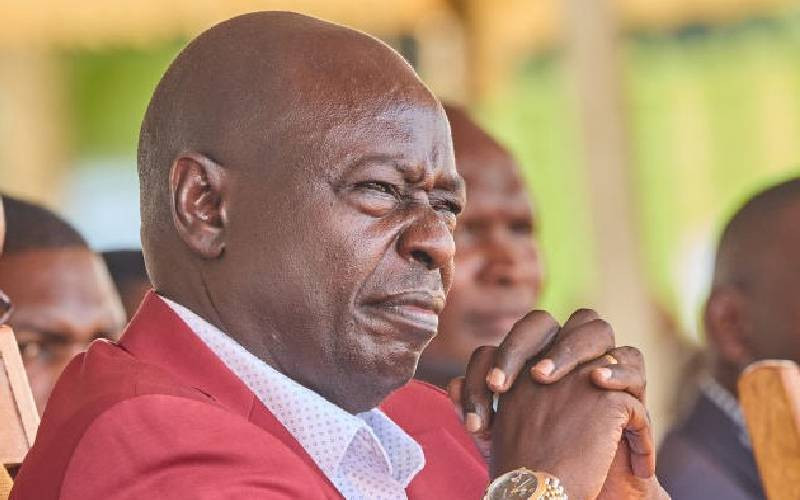- Details
- East Africa
- 773
High cost of living, taxation, ongoing doctors strike and calls for unity dominated sermons as Kenyans countrywide convened to mark Easter.
However, the festive mood was depressed in several parts of the country, with many families claiming that the tough economic times had robbed the season of its flair.
Spot checks by The Saturday Standard in several towns as well as interviews with residents established that a majority of them were happy with the religious significance of Easter but the tough economic times had dampened the mood. While worshippers thronged some places of worship, other Kenyans went about their businesses as usual.
In Nairobi, Kenyans thronged different churches to mark Good Friday where religious leaders faulted politicians for making Kenyans' lives miserable though taxation.
They accused the leaders of orchestrating the high cost of living and burdening Kenyans with increased taxes. At the All Saints Cathedral, Archbishop Jackson Ole Sapit called on the government to review its taxation measures to lower the cost of living.
Ole Sapit said that the high cost of living had weighed down on many Kenyans. “We call upon the government to review taxation, particularly on the farming community, since that is where we draw energy from as a nation and the sustenance of every family”.
The archbishop highlighted that the celebration of the day signified Christ’s love for humanity.
“We were celebrating today a meeting point of sorrow and love in an amazing way that humanity cannot understand unless helped by the spirit of God,” said Ole Sapit.
He also urged the government to ensure that Kenyans received quality services in all areas in order to create quality and peaceable lives for all.
“We don’t expect a scenario where we are having a prolonged strike of doctors without it being resolved, just because there are no resources. We expect good roads and the education sector to thrive,” he said.
At the Holy Family Basilica, Bishop Philip Anyolo criticised the government for failing to solve issues bedeviling Kenyans, including the doctors strike and the scourge of fake fertiliser. “In Kenya, we have heard recently that wrong fertiliser was supplied, something that should not happen. That is a big failure and a criminal offence,” said Anyolo.
“We want to do things that are transparent and open to help not only ourselves here, but to help also the future generation and sustenance of our land... Because we can't be fertilising our lands with stones,” he added.
“These are mistakes that have been done in the past and they are weighing heavily on us today. We have however not lost out yet,” said Anyolo.
He termed as ‘very basic’ the request that the government and all leaders should enter into dialogue. “We do not want to end up with people dying, because there are things that we have not discussed together to help humanity,” he said.
In Nakuru, Bishop Cleophas Oseso led other religious leaders and hundreds of faithful to condemn the high taxes and harsh economy.
The Bishop led the faithful on a 7km Way of the Cross walk, to commemorate the passion and death of Jesus Christ during the Good Friday celebrations.
Oseso urged Christians to condemn high taxes, corruption and immorality and also avoid the vices that threaten the architecture of the success of a society.
“Kenya is a Christian country but we still have corruption, high taxes, murder, discrimination and immorality. We should look into our hearts and be role models.
Oseso carried the cross for one of the 14 stations celebrated by Catholics. He was in company of Vicar General Fr Gerge Munyaka, nuns and other priests who led in teaching across all stations.
“It is time to change the country and ensure we lead in improving our economy, environment and we also spread the word of unity across the country,” said Munyaka.
James Wambua, a faithful, said the Way of the Cross is a reminder to Kenyans to be good to others and leaders to show compassion to suffering Kenyans.
The celebrations will continue tomorrow on Easter eve and Easter celebrations will be marked on Sunday and Monday.

In Kakamega, a handful of Christian faithful visited churches as many remained indoors, claiming the hard economic times occasioned by aggressive taxation had left them with so little to party with.
Bishop Julius Abungana, of the Believers Ministry, said the number of people who reported for the service had drastically dropped compared with previous years.
“My sermon was around the Easter season... With the state of affairs, I have a feeling that the people are hurting; some lack fare to come to church as the focus of many -- the jobless and the employed -- is on what they will eat,” said Abungana, also the chair of the Kakamega bishops and pastors.
The Catholic and ACK churches in the heart of Kakamega town also witnessed a handful of faithful with most of the pews remaining empty.
The Good Friday services were short, accompanied with street processions to mirror the journey the Messiah took on the way to crucifixion.
The biggest open space park in Kakamega, Muliro Gardens, was packed with hundreds of people and police who were on patrol.
Most were sleeping idly in the park to pass time as a handful took family photos and let their children engage in fun activities such as face painting and bicycle riding.
“I have too many problems to the extent that holidays no longer make sense to me. I am hopeless because the politicians have made my take-away home so little through the Finance Act 2023 that there is nothing I can do to mark a holiday,” said Alex Musundi, who was whiling time away at Muliro Gardens.
“I have school fees and food to worry about rather than care about the Easter holiday. We hope for a Kibaki moment when things can turn around.”
Bishop Ken Barasa, of the House of Grace, asked the government and doctors to mark Easter by putting the interests and lives of poor Kenyans at heart and end the medical crisis.
“Our health sector is a key pillar. If they (government and doctors) cannot agree, they should involve religious leaders to help arrive at a deal that will ensure the poor get services,” he said on the sidelines of the Easter Service.
His sentiments were echoed by Kakamega Catholic Diocese Bishop Joseph Obanyi, who said many Kenyans were suffering owing to the strike.
At the same time, he took a swipe at the "excessive taxation", saying: "As a country, we have to start thinking about how we can reduce taxes so that the needy in society can get basic services like medication, education and also make savings."
Similarly at the Coast, clerics claimed that the tough economic times are weighing down on Kenyans.
Mombasa Catholic Archbishop Martin Kivuva urged the government to redouble its efforts in fighting corruption, which he observed had reached alarming levels.
Kivuva, who is also the chairman of the Kenya Conference of Catholic Bishops (KCCB), warned that corruption could discourage Kenyans from paying taxes if it was left unchecked, especially in high places in government.
Speaking at the Holy Ghost Cathedral in Mombasa, where Christians gathered to mark Good Friday, Kivuva challenged the Ethics and Anti-Corruption Commission (EACC) to go after every corrupt individual and slay the ghost of corruption to save public resources.
"Corruption will discourage Kenyans from paying taxes and make them not take their responsibility to their country if we do not fight it. Leaders are stealing from the public. Kenyans must change their ways," he said.
He said graft was partly to blame for the heavy government borrowing that has further burdened Kenyans financially.
He, however, called for dialogue in solving challenges that face the country to ease the suffering of ordinary Kenyans.
He also appealed to Kenyans to help one another surmount the challenges brought about by the economic downturn, saying even Jesus Christ got support when he was carrying the cross before being crucified.
In Migori and Kisumu counties, hundreds of worshipers thronged churches for the celebrations.
St Joseph's Mission Ombo Church had its worshippers make a procession around Migori town as a man carried the cross to signify the suffering of Christ on the way to Calvary.
During the procession, believers sung songs as police led at the front to offer security.
In Awendo town, worshippers moved in a procession that started at Kokuro area up to St Paul of the Cross Awendo.
The activities included fasting and a church mass at 3pm.
"I looked forward to this day. Though the economy is harsh on us, we still have to celebrate Easter," said Magdalene Achieng'.
Samuel Achola, a priest at Anglican Church of Kenya (ACK) St John's the Evangelist Church in Migori, spread a message of hope, urging Kenyans to remember the less fortunate.
“This is the day Christ was crucified. We mark it to remember how Christ suffered and was crucified for our sins. We need reflect our relationship with our God,” said Achola.
He called on parents to look after their children who would soon be closing school.
He asked the government to review the new education model, saying that parents, children and teachers still don’t understand the Competency Based Curriculum (CBC).
In Nyeri, believers walked for nearly seven kilometres while singing hymns and reciting prayers.
Archbishop Emeritus Peter Kairo, who led the procession, expressed his joy at the turnout.
"This procession is not just about remembering what happened to Jesus on that day; it is also an opportunity for us to come together as believers and express our gratitude for what He did for us," he said.
He added that during this Good Friday and Easter holiday, Kenyans should forgive each other just as Christ did.
"During lent, we have learned about forgiveness instead of seeking revenge, we pray that our Christians will follow the teachings of Christ. I also appeal to the government to intervene and end the doctors' strike, our people are suffering," he said.
[Report by Maureen Wanjiku, Harrison Ngola, Robert Amalemba, Benard Lusigi, Daniel Chege, Anne Atieno, Patrick Beja and Amos Kiarie] The Standard








